College of Human Sciences
Calling on the church to become the voice and moral conscience of society

Fr Lawrence Ndlovu
Themed Kairos at 40: A call to prophetic renewal and ethical courage, Unisa, in partnership with the Fohloza Foundation, held the 3rd Kairos Public Lecture at the university’s Muckleneuk Campus, on 30 October 2025. The lecture represented a crucial intellectual and moral engagement with the persisting relevance of the Kairos tradition in contemporary socio-political and theological discourse.
The lecture further celebrated the 40th anniversary of the 1985 Kairos Document, which called on the church to discern and challenge systemic injustice, and to also reclaim Kairos as a hermeneutical lens through which the present crises of humanity may be interpreted. Additionally, it underscored the enduring moral imperative of the legacy of Kairos, which highlights that every historical moment demands a prophetic response rooted in compassion, ethical responsibility and transformative action for the common good.
The Fohloza Foundation’s Executive Director, Father Lawrence Ndlovu, stated that the Kairos Document enabled, particularly, the Christian community and the rest of the theological societies in South Africa to promote the teaching of the gospels for the emancipation of the people. Ndlovu added: "Accordingly, this marks an important milestone of the document, focusing on the core ideologies that must persist today, such as human rights as enshrined in the gospels and various religions. It has brought inspiration to communities and people across the world, and solidifies the path to justice, peace, and the advancement of human dignity."
Representing the College of Human Sciences, Prof Mokhele Madise, Director of the School of Humanities, affirmed that the document’s milestone offers not only a moment of reflection, but also a renewed sense of purpose to continue engaging with today’s pressing questions through the critical, ethical and human-centred lens of the humanities. He remarked: "Together with Unisa’s Department of Philosophy, Practical and Systematic Theology, this partnership continually advances our shared mission, not only to enhance the visibility of the college and university, but also to contribute meaningfully to the formation of ethical leadership in various institutions."

Dr Nkosazana Dlamini-Zuma
Keynote speaker Dr Nkosazana Dlamini-Zuma, former Minister, former Chair of the African Union Commission and Chancellor of the University of Limpopo, shared that in South Africa, the Kairos Document arose in response to systematic oppression, dehumanisation and structural violence that denied the majority of the population their God-given worth and dignity. She continued: "It further exposed the moral bankruptcy of a regime that sought to certify oppression by distorting theology."
For Dlamini-Zuma, the Kairos Document challenged the church to move from passive observation to challenging oppression; thus, standing in unwavering solidarity with the oppressed. She also indicated that its foundational conviction was that faith cannot be divorced from justice, but that theology must become a living ethical practice that engages history, unmasks falsehood and transforms society.
"Kairos called on the church to speak truth to power, and act courageously in pursuit of justice and human dignity," she said. "In heading this call, the church joined hands with human rights activists, liberation movements and civic organisations, forming a powerful moral alliance that exposed apartheid’s immorality to the world." Further, Dlamini-Zuma lauded South African liberation theologians who asserted that the church must become a voice of the voiceless and a moral conscience of society.
She noted that the church demonstrated that faith without action was complicit in oppression. Dlamini-Zuma posited that the church must help combat social issues such as inequality, poverty, gender-based violence and crime. She further questioned whether the church at present focuses on power, commercialisation and is inward-looking. She affirmed: "The church must become a vehicle of hope and transformation, not exist in isolation but operate within the structures of society, and be a critic and partner of the government." Dlamini-Zuma called for a Pan-African Kairos based on a vision of shared leadership and unity.

Prof Puleng LenkaBula
Responding to the lecture, Prof Puleng LenkaBula, Unisa’s Principal and Vice-Chancellor (VC), thanked Dlamini-Zuma for reminding attendees about the imperative of the Kairos. She highlighted that it is an invitation to theologians to create a counterculture against the system of oppression and denigration of humanity, especially of Black people. "The Kairos is not just a recognition of a moment, but is an invitation to truth-telling to transform society," said the VC. She also recognised women who contributed to the Kairos Document and were committed to advancing humanity and justice.
"If we undermine humanity or each other, just as apartheid did, we are also undermining God as we were created in His image," she affirmed. LenkaBula criticised the church for becoming a den of vultures and predators, drawing on the suffering of the people and chasing profit instead of advancing humanity. She urged that oppressive experiences should be used as moments of solidarity and liberation, and to build moments of truth. She asserted: "To reimagine the Kairos, we must expose, resist and create countercultures and alternative systems based on humanity and inclusivity."
In closing, Prof Tshepo Lephakga, Chair of the Department of Philosophy, Practical and Systematic Theology, expressed his appreciation for the thought-provoking address by Dlamini-Zuma, one which he said challenged the church not to be neutral. Speaking against political pietism and Christian quietism, Lephakga said that he supports the call for a Pan-African Kairos. He concluded: "Neutrality cannot be the order of the day."
* By Nancy Legodi, Acting Senior Journalist, Department of Institutional Advancement
** Photography by Shooheima Champion, Unisa Multimedia Office
Publish date: 2025-10-31 00:00:00.0


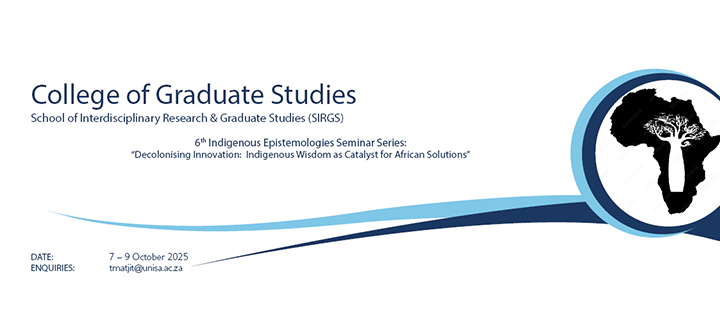 Decolonising innovation: indigenous wisdom as a catalyst for African solutions
Decolonising innovation: indigenous wisdom as a catalyst for African solutions
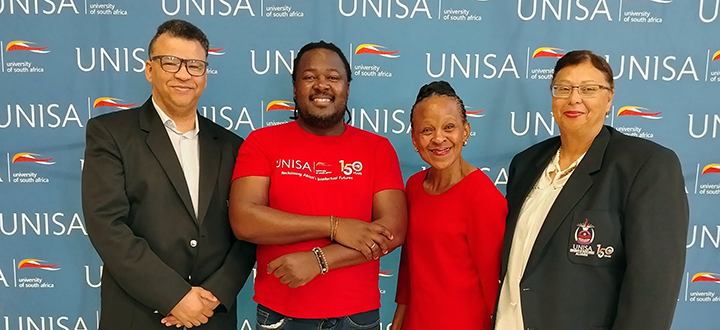 Unisa alumni inspire Elswood Secondary School learners to strive for excellence
Unisa alumni inspire Elswood Secondary School learners to strive for excellence
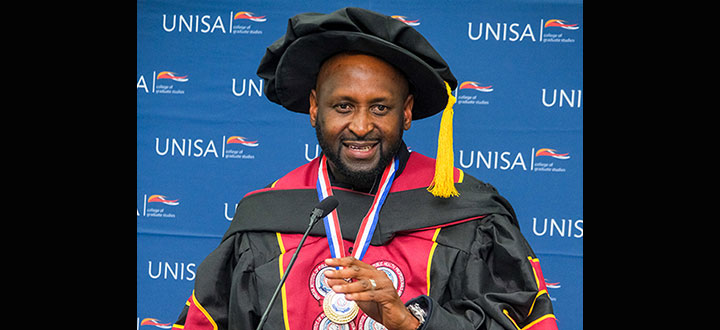 Unisa celebrates postgraduate and catalytic niche area excellence
Unisa celebrates postgraduate and catalytic niche area excellence
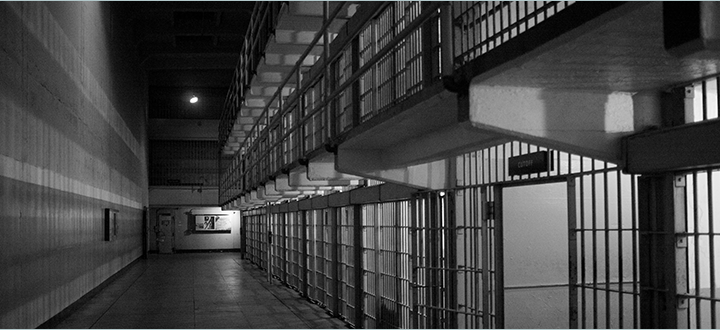 Mangaung inmate turns a leaf by obtaining a Unisa LLB degree with multiple distinctions
Mangaung inmate turns a leaf by obtaining a Unisa LLB degree with multiple distinctions
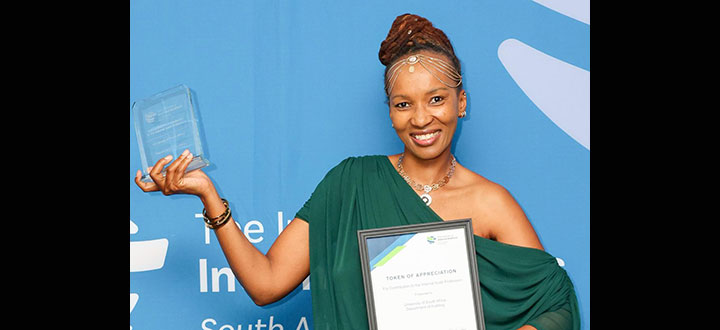 Another landmark achievement as IIA SA honours Unisa's Department of Auditing
Another landmark achievement as IIA SA honours Unisa's Department of Auditing